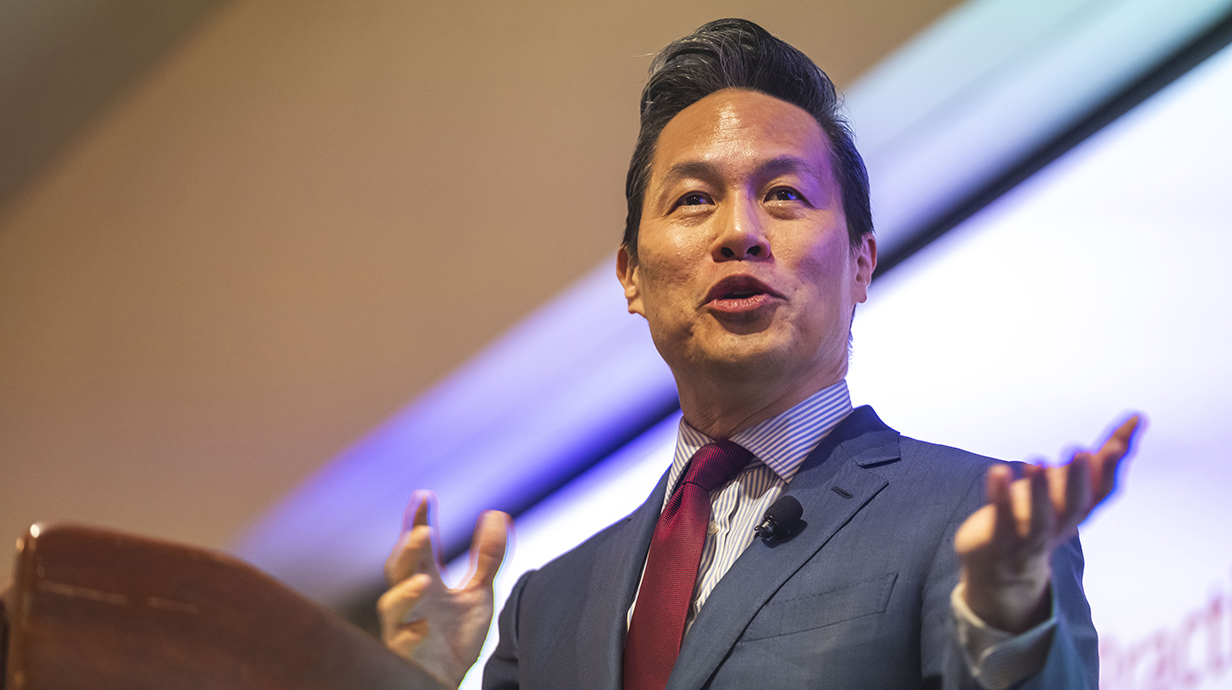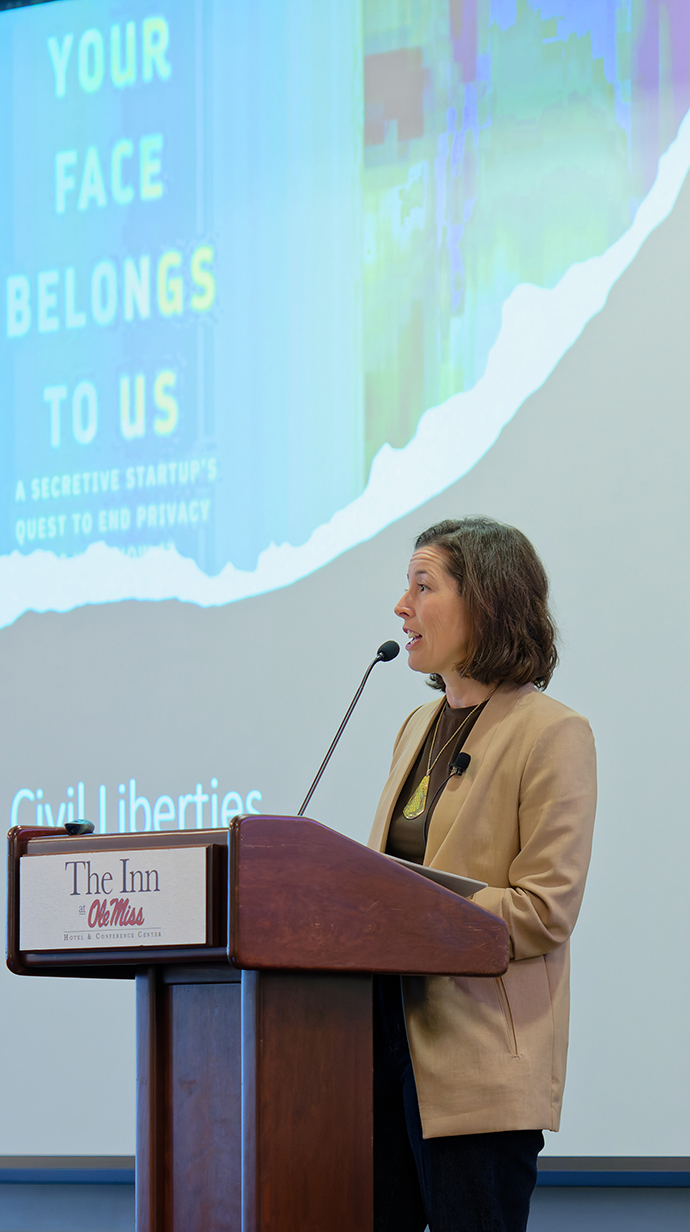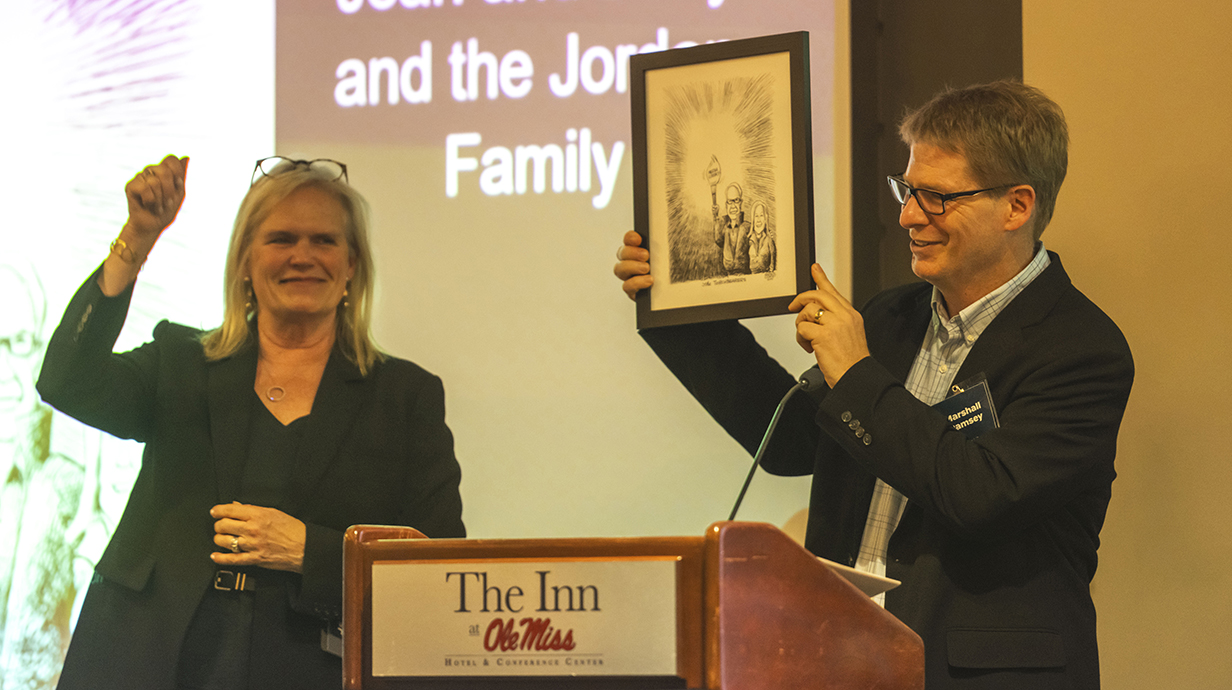Jordan Center Symposium Addresses Tech Influence on Democracy
Experts from journalism to law urge caution, offer advice on advancing tech

OXFORD, Miss. – In the rapidly evolving digital world, media distrust, misinformation and bad actors threaten American democracy. Experts from across the country discussed those wide-ranging risks at an inaugural University of Mississippi symposium this week.
The Jordan Center for Journalism Advocacy and Innovation hosted its debut event, "Addressing the Impact of Social Media and Artificial Intelligence on Democracy," on Tuesday and Wednesday (April 1-2) at The Inn at Ole Miss. Top journalists, researchers and business leaders spoke on a range of topics, including censorship, media literacy, ethics, and the intersection of artificial intelligence and U.S. law.

Kashmir Hill, a New York Times technology reporter, discusses the privacy threats of facial recognition software during the 'Addressing the Impact of Social Media and AI on Democracy' symposium. Photo by Hunt Mercier/Ole Miss Digital Imaging Services
Lawyers, journalists, academics and students attending the event posed questions to the 14 speakers about online privacy, AI regulation, verifying and trusting news sources, and the malicious use of social media to influence American politics.
Andrea Hickerson, dean of the School of Journalism and New Media, said it is rewarding to see such diverse interest in the changing landscape of journalism, politics, technology and protecting communities.
"There's a lot of people here who have different political opinions, but we can all agree that lies are bad," Hickerson said.
"Our communities have common ground, and the Jordan Center role is to highlight the power of that common ground, which is a healthy democracy."
Finding common ground has become increasingly difficult amid the dizzying pace of online chatter. With the development of other tech barriers, such as digitally manipulated videos called deepfakes, online users sometimes cannot trust their eyes.
The rapid creation of false news websites serves as a catalyst in the spread of disinformation, said Steven Brill, journalist and founder of Newsguard. Large language models, such as ChatGPT or Google Gemini, can also amplify misinformation.
Social media is also one of the largest amplifiers of misinformation due to echo chambers, anonymity and lack of fact-checking.
The Jordan Center has the potential to make a major difference in helping communities better understand how to know what's real, Brill said.
"You can illustrate how to be careful, illustrate what to look for and illustrate the consequences of it," he said. "I think that makes a big difference, but that is the eternal question in a democracy, which is, how do you get people to care and not to roll over?"

Marshall Ramsey (right), editor-at-large for Mississippi Today and a nationally recognized editorial cartoonist, presents a custom drawing to Jean and Jerry Jordan at the inaugural symposium hosted by the center that bears their name. Photo by Srijita Chattopadhyay/Ole Miss Digital Imaging Services
Jerry Jordan called civic ignorance a "marketplace" for threats to democracy. That's why he and his wife Jean, both former Ole Miss professors, gave a $4 million gift to establish the Jordan Center at Ole Miss in 2024.
"The right education will inoculate equally against every one (of those threats)," he said.
Event speakers cautioned over oversimplifying the advance in digital platforms as a threat. However, the message was clear: a path forward that protects the fabric of the nation requires the investment of policymakers, journalists, legal professionals and community members.
"It is so rewarding to be here in this moment of time and to have the opportunity to live our flagship mission," Hickerson said. "To be a convener for these ideas is terrific. It's also encouraging to hear that people are interested in the Jordan Center's strategy and asking what comes next.
"This is just the launching off point."
Top: NBC and MSNBC news anchor Richard Lui delivers the keynote address at the inaugural symposium hosted this week by the Jordan Center for Journalism Advocacy and Innovation. Lui told attendees that society must make practical pivots and harness the power of artificial intelligence to protect the integrity of journalism. Photo by Srijita Chattopadhyay/Ole Miss Digital Imaging Services
By
Marvis Herring
Campus
Office, Department or Center
Published
April 03, 2025
